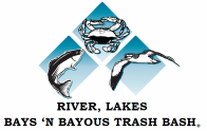Trash Bash Educational Videos
Watersheds and Nonpoint Sources of Pollution
We all live in a watershed, and and through that watershed our daily activities can have an impact on our local waterways and even Galveston Bay. Check out the videos below to learn more about how you are connected from Backyard to Bay.
Video Topics relate to the following TEKS: S.AQ.12; S.ES.9.A; S.7.8.C;
We all live in a watershed, and and through that watershed our daily activities can have an impact on our local waterways and even Galveston Bay. Check out the videos below to learn more about how you are connected from Backyard to Bay.
Video Topics relate to the following TEKS: S.AQ.12; S.ES.9.A; S.7.8.C;
|
|
Artist Boat's nonpoint source workshop discusses how pollution can travel through Galveston Bay's watershed and the effects it can have.
Related Activities:Additional Resources:
|
|
|
The Baytown Nature Center's "It's All Downstream From Here" video highlights how small instances of litter add up throughout the watershed to a big problem downstream.
Additional Resources:
|
|
|
The Galveston Bay Foundation's program, Cease the Grease, shares how Fats, Oils, and Grease (FOG) is made and how easy it is to properly dispose of it so that it doesn't create a costly mess for you or our waterways.
Related Activities:Additional Resources:
|
|
|
City of Houston's Protect Our Pipes program discusses how to properly dispose of Fats, Oils, and Grease (FOG).
Related Activities: Additional Resources:
|
|
|
City of Houston's Protect Our Pipes program shares some tips on how to prevent our sewers and pipes from overflowing or backing up - keeping bacteria from entering our watershed.
Additional Resources:
|
Litter, Recycling and Sustainable Alternatives
Litter is one of the most visible forms of pollution in our waterways and throughout watersheds. Check out the videos below to learn more about how litter impacts wildlife and what you can do to help keep our waterways clean.
Video topics relate to the following TEKS: 1.B for S.K-8, AQ, ESS, ES; S.AQ.12; S.ES.5.F
Litter is one of the most visible forms of pollution in our waterways and throughout watersheds. Check out the videos below to learn more about how litter impacts wildlife and what you can do to help keep our waterways clean.
Video topics relate to the following TEKS: 1.B for S.K-8, AQ, ESS, ES; S.AQ.12; S.ES.5.F
|
|
The Citizens Environmental Coalition Houston shares how to Recycle Right. You can learn more about recycling at the HERE In Houston website with videos, activities and lessons, and more.
Related Activities:
|
|
|
SPLASh's (Stopping Plastics and Litter Along Shorelines) video details two main impacts trash pollution can have on wildlife: ingestion and entanglement.
Related Activities:Additional Resources:
|
|
|
SPLASh's video talks about the Top 5 most common types of trash found along our coastlines and what you can do to help.
Related Activities:
|
|
|
The Galveston Bay Foundation's Sustainable Sasha provides some tips on how to reduce, reuse and refuse single-use plastics to help keep litter out of our waterways.
Related Activities:Additional Resources:
|
Thank you to all the volunteers and sponsors who continue to support
the River, Lakes, Bays 'N Bayous Trash Bash®!
Join us on Saturday, March 29, 2025 for the 31st annual Trash Bash®!
the River, Lakes, Bays 'N Bayous Trash Bash®!
Join us on Saturday, March 29, 2025 for the 31st annual Trash Bash®!
